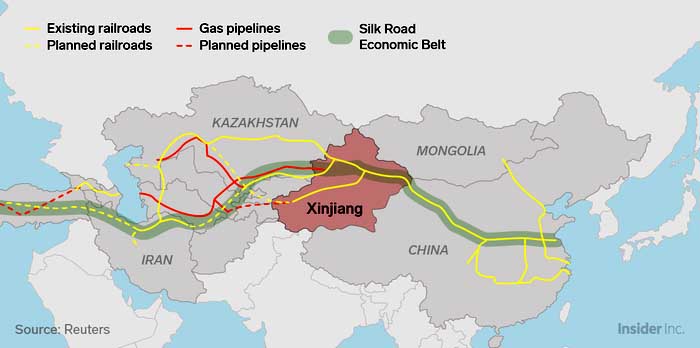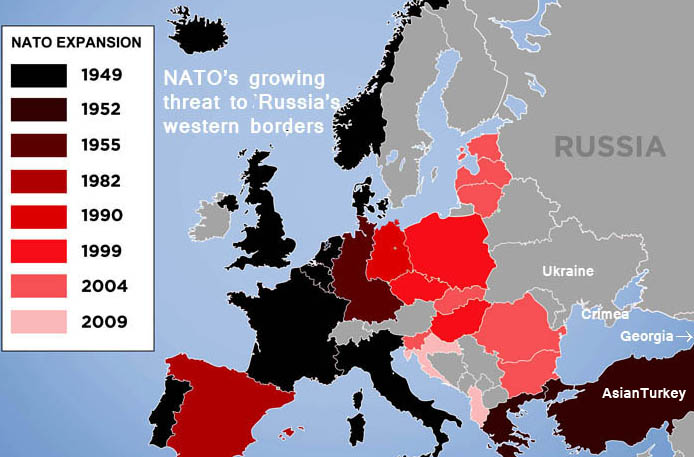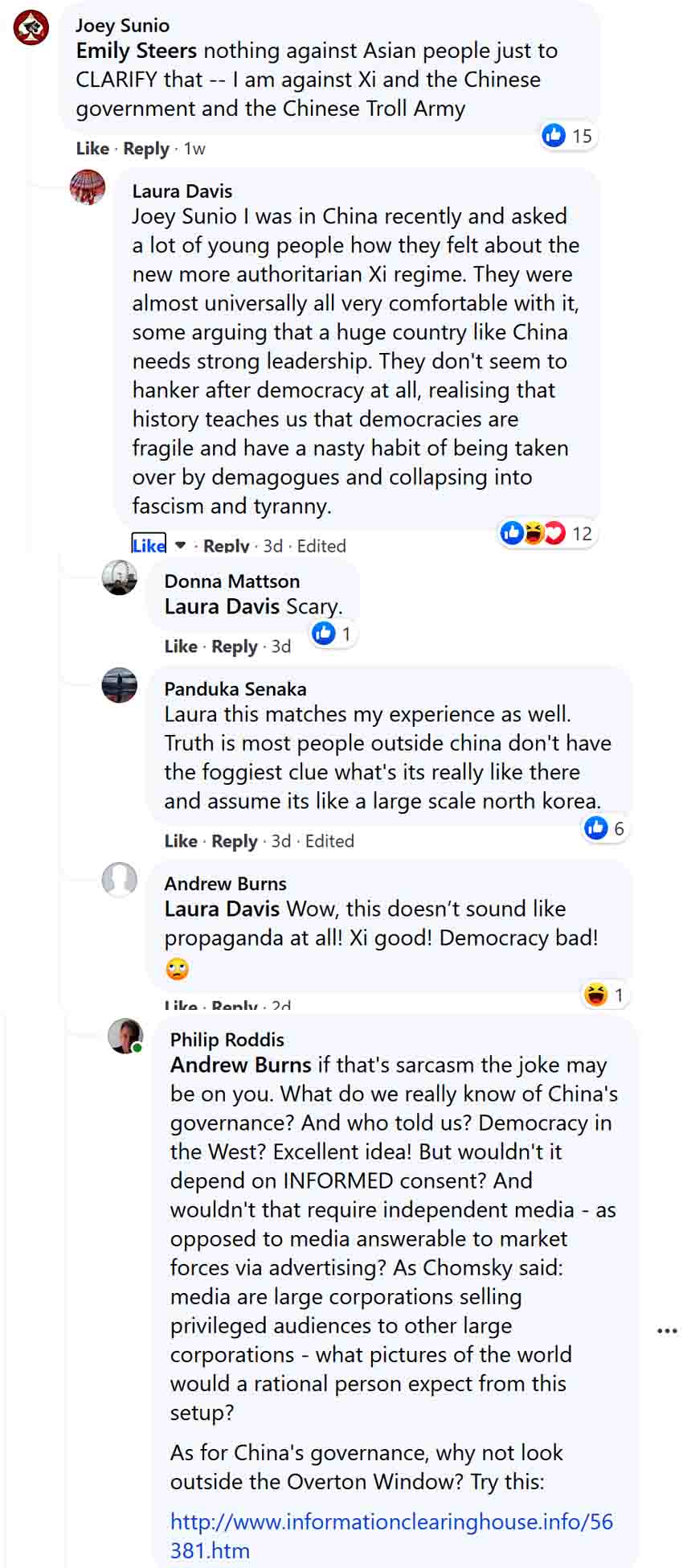Uighur brouhaha? A simple map can be worth a thousand words …
To say I’m alarmed by the sinophobic bellicosity of Washington and its thermonuclear satellites, my country very much included, would be a gross understatement. In the world’s three likeliest flash points for Armageddon – South China Sea, Middle East and Russia’s Western borderlands – at issue is the rise of Eurasia, and investor panic in the West as the sun begins to set on 500 years of global plunder. From slave traders and East India Company, through direct colonial rule and settler states1 to imperialism2 and petrodollar hegemony,3 a game played on a rigged deck for half a millennium is in its twilight phase.
If “we” go to war in the name of lofty ideals but the interests of profits, it will hardly be the first time. As early as 1933 Major-General Smedley Darlington Butler – dubbed the Fighting Quaker and at the time the most decorated Marine in US history – said this:
I spent thirty-three years as a member of this country’s most agile military force, the Marine Corps; most of the time as a high class muscle-man for Big Business, for Wall Street and for the Bankers. In short, I was a gangster for capitalism. Capone ran his racket in three districts. I operated on three continents.
But if our rulers take us to war with China (which means Russia too) it will be the first since 1945 against states of remotely comparable weight. And the first ever against nuclear powers.
For why the old Cold War did not end with the fall of the USSR, see Our Beautifully Democratic Wars
It seems only right then that we dig a little deeper than our leaders, and media compromised in ways explored many times on this site, would have us dig. The three reads recommended in this trio of posts do just that.
*
Read one takes a microscope to one theatre among many in the war of words on China. I refer to the alleged abuses of a Uighur people concentrated in the Central Asian province of Xinjiang. It no longer surprises but does continue to dismay me that in the grip of …
- deeply held but unexamined assumptions of the superiority of Western democracy,4 imbibed cradle to grave in school and on our screens in forms some call ideology and some ‘the matrix’, but for most folk seem just common sense;
… in the grip also of …
- … depictions of far off places by media showing vigorous dissent on lesser issues but dependably hostile – in ways gross or subtle as determined by market position and scale of perceived threat – to any state deemed an obstacle to Western profits …
… minds otherwise critical turn to jelly. As I put it in paragraph one of that Uighurs post:
Few things are more predictable than the demonising by corporate media of ‘regimes’ which obstruct, directly or indirectly, the will of Wall Street. But while the general truth of this may be acknowledged within intellectual circles, its applicability to any specific target of propaganda blitz has a way of inducing localised amnesia until the heat dies down. And nothing has rattled Wall Street more than the rise, faster than foretold, of China from sweatshop for the West to global challenger of dollar hegemony.
In this regard that moral panic on the Uighurs – for more evidence of its manufactured nature, see the links supplied below the line by readers – was simply by way of example. Important as the specifics are, more important still is the general truth they point to. To obstruct Wall Street (here used both as metonym for Western capital and literal hub of its most powerful player) is to draw an orchestrated opprobrium dutifully invoked by ‘our’ media as the authentic voice of ‘The International Community’.5
*
Read 2 focuses on the nature of China’s governance. Here too deeply embedded narratives combine with media disinformation – lies of commission, yes, but far more misleading in the long run are those of omission6 – to keep our perceptions of China at the level of caricature. This FB encounter, below an Economist post, highlights perfectly the ensuing mix of sarcasm, spoon-fed ignorance and complacent superiority:
The link I offer Andrew Burns, without supposing for a moment he’ll follow it, is to my read 2 – How democratic is China?
*
As for China read 3 – The Long Game and its Contradictions (3347 words) – it’s time to fess up. I already recommended it as one of my two March reads. I’m doing so again now because of its importance, and because the first time round it was overshadowed by an unusually long and doubly controversial read – irking on the one hand those who take Covid-19 at face value as a deadly threat, on the other those who float ‘plandemic’ conspiracy theory.7 In that March reads post I introduced The Long Game with these words:
I’ve seen Eurasia’s resurgence in global terms, as a welcome check to a US dominance helpfully laid out, early this century, by a Dubya aide widely believed to be Karl Rove.8
“We’re an empire now, and when we act, we create our own reality. And while you’re studying that reality — judiciously, as you will — we’ll act again, creating other new realities, which you can study too, and that’s how things will sort out. We’re history’s actors . . . and you, all of you, will be left to just study what we do.”
And because I’ve seen Eurasian resurgence and its attendant demonisation in global terms, I’ve done little to gain internal perspectives. How does Russia see herself? How does China?
This lucid read, by Berlin based He Zhao, is a breath of fresh air; its shrewd but sympathetic appraisal of China realpolitik a worthy complement to the writings of two others cited more than once [on this site]; the Brazilian journalist Pepe Escobar and the American economist Michael Hudson.
*
Together then, my China reads offer:
- A 7,000 word close up on one instance of how ill served we are by media vilification, in ‘liberal’ and ‘quality’ media no less than in their rightwing and tabloid counterparts, of states and leaders our rulers fear economically.
- A detailed account (3600 words) of how the election of leaders and formulation of policies actually work in today’s China. Expect to be surprised.
- A 3350 word assessment of China as world player. Towards the end it offers this:
These myopic and short-sighted “left com”, “ultra-left”, or modern “Maoist” types love to denounce modern China as a betrayal of socialism, without considering that it is the failure of the Western left to do successful revolutions in their countries which made it necessary for existing socialist states to adapt to global conditions of entrenched neo-liberal capitalism.
Those who think that 1.4 billion people, who for 200 years suffered under vicious colonial rule and brutal capitalist domination, will so quickly forget what their true enemy is, don’t know much about capitalism, colonialism, or people.
The fight against capitalism continues, but on economic grounds. Because war is the way of imperialism, and military spending accounts for 90% of US GDP, while Chinese socialism is developing alliances with Africa, South America, Europe, and other parts of Asia based on mutual development. Socialists will beat the capitalists at what they consider their own game through markets with rational planning, and through peaceful trade and prosperity for all, end bourgeois global hegemony.
In that last cited passage He Zhao makes clear his sympathies. He can and undoubtedly will be accused by reactionaries, liberals and far left alike of acting as a mouthpiece or useful idiot for Beijing. To greater or lesser extent the same can – and again undoubtedly will – be said of the authors of the first two pieces. But if even half of what they say is true, on offer is a ray of hope where otherwise I see only darkness and the dreams of children. Given the war drums beating, don’t we owe it to ourselves, and those yet to be, to look with fresh eyes at what we think we know about China? To that end these three reads may be useful starting points.
* * *
- The two violently settled states of the Antipodes, two in North America and one in the Middle East are of course – regardless of geographic location – firmly in ‘the west’ or ‘global north’. All are greater or lesser imperialisms as defined in footnote 2. (And/or, in the case of Israel, beachheads for the same.) Hence my interchangeable use of the three terms. The connotations may vary but, at the level of denotation, ‘west’, ‘global north’ and ‘imperialist powers’ all mean the same thing on this site.
- Again I offer my standard definition of modern imperialism as the export from global north to south of monopoly capital, and repatriation from south to north of profits. More detail here.
- ‘Petrodollar hegemony’ rests on a string of events taking in Bretton Woods 1944 … Nixon’s 1971 decoupling of dollar from gold (on which Bretton Woods had been premised) to pay for Vietnam … and the mid seventies cementing of autocratic power by the Wahabbi clique ruling Saudi Arabia as the US gained from oil transactions the world over conducted in dollars. (Other imperialisms didn’t like it one bit, France’s Valery Giscard d’Estaing rightly calling it ‘America’s exorbitant privilege’. But in a once bipolar, then briefly unipolar, and now shifting world order the benefits of staying in the US orbit outweighed, and for now still do, the downsides for the investor classes, and are sold to the sleeping masses as a kinship of The Free World.) Gaddafi in Libya, and Maduro in Venezuela, had or have threatened to move from petrodollars, while China’s every move these past two decades – Asian Infrastructure Investment Bank to give the global south and even Europe an alternative to the privatising hawks of the IMF … One Belt One Road … rising BRIC economies and ever stronger links with the bêtes noires of Moscow and Tehran – speaks to its growing refusal to kowtow to Wall Street and Washington. (Iran, though seemingly a minor player in military terms, and off the map economically, has wisely invested in the means of asymmetric warfare, for which she is rightly feared in Tel Aviv, Riyadh and consequently Washington, for whom Saudi Arabia – its oil fields vulnerable, as Yemen’s Houthis have shown, to low-tech missile strikes – may be more important in the long run than Israel.)
- There are many paths to the truth of Western democracy as a chimera. One is that consent is only meaningful if informed. For that we’d need independent media, not media in thrall to market forces through a two hundred year old model of advertising dependency.
- ‘The International Community’ can with accuracy be thought of as those leaders, in both the imperialist and imperialised worlds, fearful of or beholden to Washington. Those outside this club are depicted as tyrants running ‘pariah’ states.
- Lies of commission do occur, like the Guardian’s on the Manafort-Assange meetings. More common though – not only safer but more flexible, hence in the long run more effective – are the lies of omission. Nowhere is this more apparent, if we would but look, than in corporate media refusal to investigate material drivers – motives more plausible than the moral protestations on offer – of ‘our’ wars and equally murderous sanctions on the peoples of disobedient ‘regimes’.
- I’m not against conspiracy theories per se. To summarise my views: (a) some prove accurate; (b) others may yet do so; (c) still others fail elementary logical or evidential tests; (d) a-priori dismissal, without engaging with their specifics, of a theory on the ground it posits a conspiracy is lazy, stupid and/or cynical. I’ve read a few ‘plandemic’ theories but have yet to encounter one I wouldn’t file under (c).
- Rove has a record of nastiness impressive even by 21st century Beltway standards. As well as defending torture – plus an email scandal of the kind that later tainted HRC, rescue from Congressional subpoena by ‘executive privilege’ and dark ‘joke’ about murdering a senator (an obnoxious one to be sure, but it’s the thought that counts) – Rove’s role in the Valerie Plame affair earned him another subpoena. This he dodged by resigning on the ground that “I just think it’s time to leave.” That covers it, I guess. Oh, hang on a minute: Rove chaired the White House Iraq Group charged with bigging up the WMD threat as cover for – among a rich mix of criminal motives – an oil grab that left at least one million Iraqi men, women and children dead and condemned the survivors to years of sectarian terror.




seems reasonable to surmise that even “the left” (whatever that is these days) can suffer from and succumb to entropy?
Much of what appears to pass for the left these days seems to be either tied to strings being pulled by the Imperialist right and it’s security establishments (in a sad caricature of Bleasdales “GBH”) given the level of Imperialist and related narratives being indulged by it; or/and more interested in scoring sectarian left gang related points off each other in a warped nod to the penultimate stanza of Dylan’s “Desolation Row.” Sitting on the Titanic yelling ‘which side are you on.’
We seem to be in horses and water territory. With any narrative which incorporates the complexities of reality and nuance vehemently denounced in favour of the straitjacket comfort blanket of the Overton Window. Warhol should have warned us that the fifteen minutes would be all caricature.
Lot of cultural refs there, Dave! But yes, yes and yes!
Bob’s Desolation Row, magnificent for all its surrealist nonsense, I first encountered at the tender age of 15 when I inherited an older step-brother with a vinyl copy – the only kind you could have in 1967 – of Highway 61 Revisited. DR, all eleven minutes of it, was the last song on side two. It, and all the others, blew my boyish mind. I penned a brief tribute a few years ago on the occasion of the album’s fiftieth birthday.
Fitting that the central character of Alan Bleasdale’s GBH – unmistakeably based on Liverpool deputy leader Derek Hatton of Militant fame – was played by Robert Lindsay. A decade earlier Lindsay had played the absurd eponymous hero of the Beeb sitcom, Citizen Smith.
On the fragmentation of the left in the West I see two primary forces at play. One is the ego’s drive to locate itself in difference. The other is that the need of our rulers to make cold war concessions – welfare states in much of the global north – and ability to do so through the super profits of colonialism and imperialism have for decades marginalised non parliamentary socialism (while irremediably compromising the parliamentary kind). With no organic connection with the realities of class struggle, hence no way of testing and adjusting revolutionary theory in the light of what does and what does not work, avowedly materialist groupings vied with one another in an utterly idealist arena – as caricaturised in the infamous Judean People’s Front scene of Life of Brian.